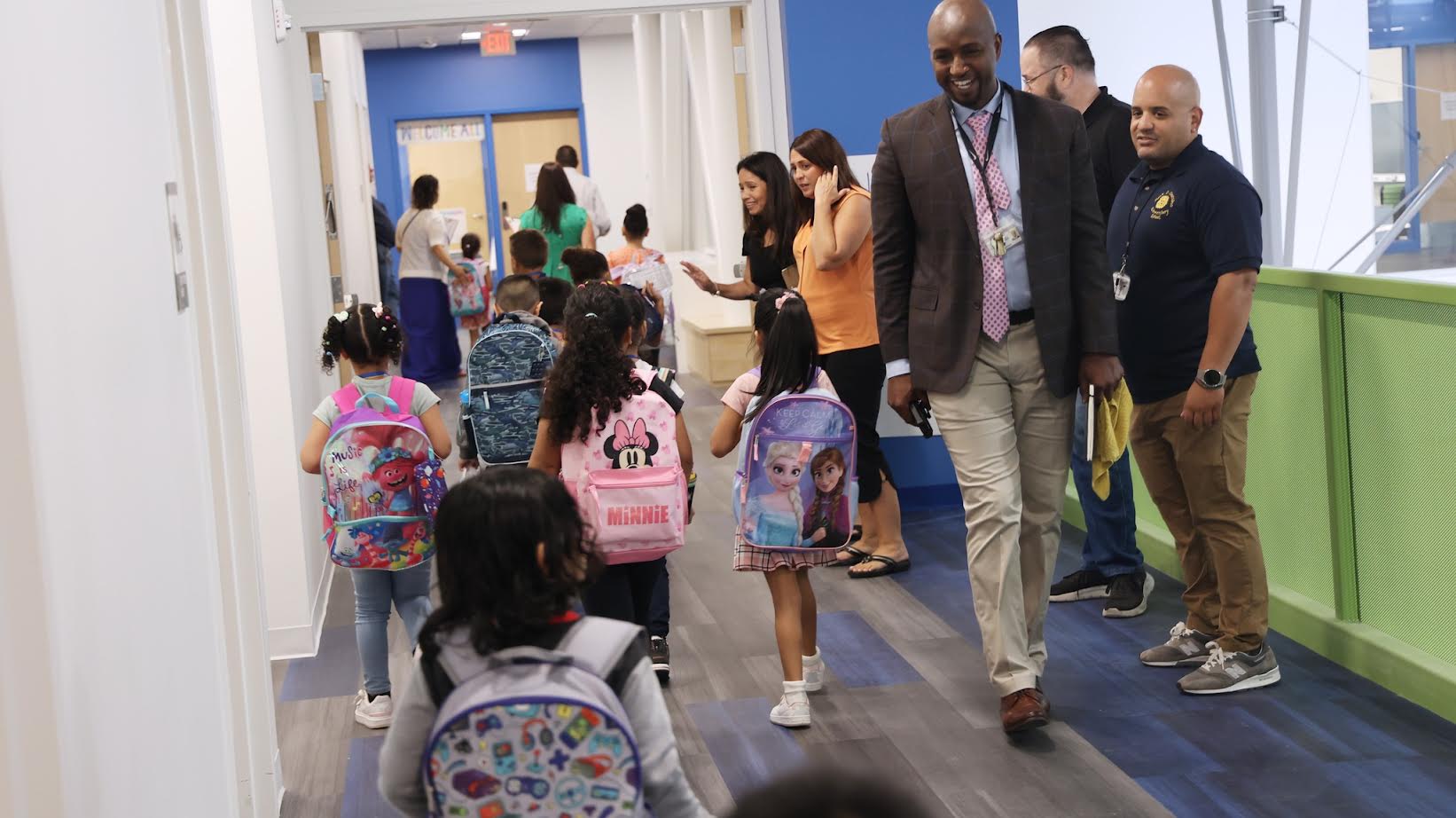One state senator’s novel idea led to new seven-day waiting period before ratifying a school contract — and better accountability

Principal Abdi Lidonde, in pink tie, and staff members greets students in the hallway at Frank D. Spaziano Elementary School in Providence on Sept. 11, 2023. (Frank D. Spaziano Elementary School/ Providence Public Schools Facebook page)
With smart, simple, respectful legislation – S0190, Sen. Sam Zurier, a Providence Democrat, has put his finger on a noxious dysfunction of Rhode Island’s public education system: contract negotiations.
With some poking around, you can usually find a school contract. But negotiations are a black box, containing gale-force pressures that shape the final product with little regard for students or education.

A modest idea from Rhode Island Sen. Sam Zuerier, a Democrat from Providence’s East Side, could have lasting impact if applied statewide. (Courtesy of Sam Zurier)
Zurier’s legislation gives a limited whiff of fresh air and transparency to the real public-school stakeholders – parents, taxpayers, workforce development folks. It requires a short breathing period after a new contract has been completed and ratified by the union. Management must delay ratification while folks not on the negotiating team can see the changes. After no fewer than seven days, the Board of Education (BOE) holds a public hearing. Only then can the administration sign off.
Sadly, the bill applies only to Providence, and only while the capital city’s schools are under state control. It’s still a good start.
Zurier served on the Providence School Board, then as a Providence City Councilor, and now is the state legislator who thinks most clearly about the big-picture and the general health of our schools. He has cred.
Seven days is a tight window for a public citizen to get up to speed. But it’s time enough to call out egregious problems without making negotiators rehash details in this often brutally adversarial work.
Zurier’s idea was sparked by the 2021 Providence teachers contract, negotiated by state-level officials and signed with zero public input. On top of retroactive raises, the teachers got a “one time” $3,000 bonus first called a “vaccination” bonus, then a “retention” bonus, both of which smelled distinctly political.
Predictably, other public-service unions wanted their $3,000, in the name of equity.
Then teachers left in droves with impunity and their bonuses.
The raises and bonuses bought provisions like mandated teacher/parent conferences and attendance at faculty meetings, which should be part of the job.
Especially maddening to Zurier, the state-level negotiators assumed the takeover nullified any need for the School Board, the public’s representatives, to vet the deal.
So he and his colleagues wrote and submitted S-0190 for the first time. It failed.
Then, another bad contract emerged in June 2023 with another set of “one time” $3,000 bonuses on top of more raises. At least these bonuses were school-directed. Kids will have 30 extra minutes a day to make up for COVID learning loss during the 2023-2024 school year.
I doubt whether more of the same-old, same-old will work. But time and data will tell.
Snubbed again, the School Board upped the volume of their demands to have the district back. I don’t know why they want it. Asphyxiating legal red tape renders the district schools unfixable. Let the state take the fall.
The 2023 contract was already a done deal when Zurier submitted S-0190 again. This time it passed, with the blessing of both the union and the BOE.
But when the state hands the schools back, poof, those seven little days of public accountability disappear.
Other districts and the national School Board Association have been discussing “open bargaining,” where the public can join labor and management at the table. But honestly, the modest scope of Zurier’s proposal is what makes it potentially great.
Once the union members have vetted the agreement, had their say and signed off, the window opens for real stakeholders, but just a crack. Education officials, both labor and management, are trained and experienced in education’s nuances better than the general public.
Honestly, the modest scope of Zurier’s proposal is what makes it potentially great.
But as adversaries, labor and management are not evenly matched here in Rhode Island. You have no idea of the hypertensive pressure on management to maintain labor peace (or curry union favor).
In theory, school boards, committees and the BOE represent the kids. But much rotten legislation, culminating with the “evergreen” contracts law, cripples the possibility of an education-focused contract without yet more raises and bonuses.
Labor strikes are illegal here, but happen anyway, with impunity. Unions can call for other anti-kid labor actions, again, with impunity. Officials who threaten labor peace by demanding reasonable reforms risk losing their elected seats or their jobs or the good will of the school(s) they must manage.
S0190 tips the negotiators’ hand. Did they discuss long-advocated priorities, like eliminating hiring and layoffs driven by seniority? Were kids even an issue? And if you think that’s a stupid question, just scan this contract’s seven-page Table of Contents in search of kids.
Surely, seven days would hold negotiators more accountable to the mission at hand. Surely, negotiators would prefer going public with shorter and more principled contracts that avoid spelling out rights to parking places and who has dibs on what classroom.
If applied statewide, this little law could be the fulcrum that leads to the redesign of those other laws that undermine the state’s education system. Zurier’s is not a baby-and-bathwater revolution. It’s respectful to labor and management.
And it would spill a little respect onto the stakeholders who’ve had to put up with decades of failure and decline.
C’mon. It’s a small ask.
First published: RI Current News, October 12, 2023
Public comments posted on this site are much appreciated. However, if you prefer: juliasteiny@gmail.com